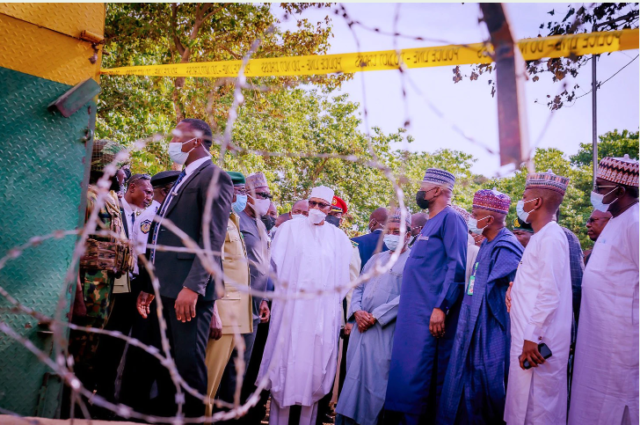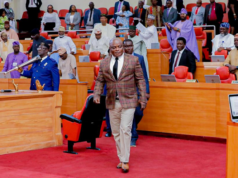
Last week, heavily armed terrorists overran Kuje prison in a daring attack. The attackers sprung free hundreds of prisoners and detainees. Among the escapees were more than sixty members of the Islamist terror group, Boko Haram.
Now, that’s a big deal. Located within Nigeria’s capital territory of Abuja, Kuje is the country’s premier prison. To be sure, it does not boast the lore and history of Kirikiri. Still, it holds its own in several respects. It’s become, for one, the default site of incarceration for the country’s VIPs – Very Important Prisoners.
Let’s say you’re a big shot in Nigeria – an ex-governor or the like – and you suffer the altogether rare indignity of being charged with and found guilty of graft, money laundering or embezzlement. Upon conviction, you’re likely to serve time at Kuje. Among the prison’s current habitués are former Governors Joshua Dariye of Plateau State and Jolly Nyame of Taraba State, an embattled celebrity cop, Abba Kyari, a former chairman of the defunct Pension Reform Task Team, Abdulrasheed Maina, and an ex- member of the House of Representatives, Farouk Lawan.
Of course, like everything Nigeriana, the prison is organized as a hierarchical two-tier structure. If you’re a certified member of the gorging class, then you’re entitled – even in disgrace – to residency in the prison’s plush section. By contrast, if you were a peasant outside prison, you’re guaranteed to remain a peasant inside the jail as well. The wretched of the Nigerian earth are consigned to the prison’s grimy quarters.
That arrangement, alas, meant that none of the VIPs could flee when the armed gang seized control of the prison. Only poor prisoners were able to take advantage of the breach.
The Islamic State of West Africa Province claimed credit for the Kuje attack. ISWAP is a splinter group that broke off from the group styled Boko Haram. No group has wreaked graver havoc, or claimed more innocent lives, than Boko Haram. In pursuit of its militantly anti-Western goal, its members have set off bombs in churches, mosques and marketplaces. They have abducted thousands of school kids. They have raped countless victims, slashed and burned many others. They have sacked numerous communities, especially in the country’s northeast zone, their hub. Their creed is simple: that Nigeria’s moral decadence is rooted in pernicious Western values and influences. The group’s singular mission, then, is to rid Nigeria of any trace of modernist and secularist orientation. Their tool is violence. The group’s mode of operation is to maximize terror. In pursuit of this agenda, the more hapless folks perish in gruesome attacks, the better.
Boko Haram and ISWAP have never had an issue with recruiting members. For decades, usurpers of the title of leaders in Nigeria have worked extra-hard to cultivate poverty. As a consequence, each zone in Nigeria, but especially those in the north, teems with young men and women with a discounted or damaged sense of the sacredness of life.
As if there weren’t already too many terrorists on the loose in Nigeria, their ranks have been swelled courtesy of the assault on Kuje prison.
What lesson might we draw from what transpired last week at Kuje? I’d say a rather simple one. The attack merely adds to the extraordinary dossier of evidence pointing to Nigeria’s system-wide incoherency. Let’s consider, for a moment, the symbolic implication of the event. Kuje is where Nigeria houses its most important – and dangerous – criminals. Even so, the entire resources of the state could neither anticipate nor ward off a siege mounted by members of the country’s most ferocious and deadly terrorist group. In seizing Kuje and freeing prisoners, the attackers fundamentally exposed the tenuousness of Nigeria’s claim to being a stable state.
I find Nigerians’ response to the bizarre fall of Kuje quite instructive. In a sense, they reacted to the bizarre news with a collective yawn. For them, their country – as a lawyer friend of mine is fond of asserting – has become a space no absurdity is inconceivable. The same week ISWAP struck at Kuje, some nameless group ambushed – and shot at – an advance convoy of President Muhammadu Buhari in his home state of Katsina. Again, Nigerians yawned.
Do you blame them? After all, a year ago, some fearless burglars took their trade into the very precincts of Aso Rock, the vast complex where the Nigerian president works and lives. They invaded the official residence of the president’s chief of staff, carting away cash and valuables. In March, armed men attacked a train in Kaduna, killed a few people, and kidnapped many. Months later, the country’s entire security and law enforcement agencies have had no clues about the attackers and how to rescue their victims. It goes on and on, this litany of crises, security breaches, and incompetence writ large.
It all buttresses the case against proceeding with the 2023 elections. A country that has sunk so deep into dysfunction and chaos – in other words, a country that’s become a shell – can hardly hold credible elections much less organize a seamless transfer of power. Instead, as I have suggested in recent columns, it’s time the country’s patriotic forces commenced serious conversation around the idea of forming an emergency interim government. This caretaker government should take over from Buhari next May, if not before, and undertake the task of thinking through a constitutional framework and what it will take to begin the foundation, finally, of a country.
Okechukwu Ndibe, better known as Okey Ndibe, (born 1960) an acclaimed Nigerian novelist, political columnist and essayist was born in Yola, Nigeria. He is the author of Arrows of Rain and Foreign Gods, Inc.
Ndibe has worked as a professor at several colleges, including Connecticut College, Bard College at Simon’s Rock, Trinity College in Hartford, Connecticut, and Brown University.
We are honored that he brings his sharp intellectual depth and years of political activism to write for Life and Times.







